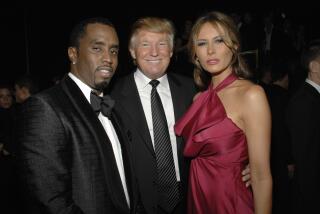Clinton Hasn’t Earned Blacks’ Vote
Perhaps it’s fitting that Bill Clinton will be awarded the Democratic Party’s nomination for president on Aug. 28. That was the date 33 years ago that Dr. Martin Luther King delivered his memorable “I have a dream” speech at the March on Washington. Clinton has often evoked the memory of Dr. King in speeches and has claimed that he and the Democrats are keeping the King legacy alive.
If polls are to be believed, many blacks think that he is. More blacks say they like Clinton than they do Louis Farrakhan and Jesse Jackson.
The big problem with this is that King deserved the respect and admiration of millions of blacks; Clinton doesn’t. He has done the kind of social and economic damage to blacks that conservatives dreamed of but couldn’t do. His failure on the big-ticket items is more than ample evidence.
Racial healing. In a speech after the Million Man March last October, Clinton repeated the shopworn stereotypes about blacks on crime, drugs, violence and family dereliction. This reinforced whites’ belief that blacks are solely to blame for America’s social problems. It’s no wonder that the racial gap in America has grown bigger than ever during the Clinton White House years.
Affirmative action. Following conservative Republican and media-driven claims that white males were losing ground to minorities, Clinton in 1995 promised to end “abuses” in federal government affirmative action programs. But Clinton must know that there is no federal mandate that forces contractors to replace white workers with minorities and women, and that there are only a handful of government set-aside programs in procurement and contracting, and that only a few scattered court decisions have explicitly upheld quotas. They applied almost exclusively to police and fire departments and did not prevent these departments from hiring whites. The issue of affirmative action inflames many whites and is used by cynical politicians to grab headlines and votes--Clinton included.
Welfare. Nixon, Reagan and Bush promised to end welfare as we know it. Clinton did. His predecessors fanned racial and sexual myths about welfare: that its recipients are mostly black women, and that it encourages cheating, laziness, dependence and out-of-wedlock births. Republicans aren’t willing to pay for job skills training, education, health and child care programs to truly end welfare dependency. Clinton isn’t, and won’t, either.
Crime. In 1994, Clinton rammed the most wasteful, punitive crime bill in American history through Congress. It gutted funds for drug rehabilitation and prevention, social service, youth employment and job training programs. It added scores of new death penalty provisions to federal law and shoveled out billions exclusively for more police and prisons. A year later, the U.S. Sentencing Commission voted 4 to 1 to recommend that modifications be made to “equalize” harsh sentences for crack given to mostly black and Latino offenders and the slap on the wrist sentences for powdered cocaine given to mostly white offenders. Clinton said no.
Defenders of Clinton’s record counter that he has appointed blacks to high administration positions, supported minority political redistricting and took tough action on the church burnings. But these were no-risk, high-return political actions. The appointments were to high profile positions with relatively little major policymaking power and influence. He abandoned his nominee to head the Justice Department’s civil rights division, Lani Guinier, and dumped Surgeon General Jocelyn Elders in the face of conservative flak.
Clinton had to support minority districts in the South, considering the potential for Democrats to lose even more seats in Congress.
And it took national protests by blacks and church groups and mass media attention before Clinton finally spoke out on the church burnings. While he approved funds for church rebuilding and tough penalties for arson, Clinton doggedly denies the possibility that the burnings are linked to white supremacist groups.
Clinton failed miserably to address America’s racial problems his first four years in the White House. The answer for blacks is not to vote Republican or Reform; so far, those parties offer even less. Nor is the answer to boycott election day, or to fan delusions of forming an all-black party. The answer is for more blacks to become independent political power brokers with both the Democrats and Republicans.
In polls, fewer blacks than ever call themselves Democrats and more call themselves “independents.” This translates into millions of potential votes that the Democrats and Republicans can’t ignore.
History has shown that ethnic bloc voting can make or break a candidate, campaign and agenda. Black political groups must demand that both parties support full employment, affirmative action, increased funding for education, health, drug and crime prevention programs and nonpunitive welfare and criminal justice reforms.
In his March on Washington speech, Dr. King called on America to “cash the check” and fulfill the promise of justice and opportunity. To get black votes, Republicans and Democrats, especially Bill Clinton, should be required to cash that check.
More to Read
Get the L.A. Times Politics newsletter
Deeply reported insights into legislation, politics and policy from Sacramento, Washington and beyond. In your inbox three times per week.
You may occasionally receive promotional content from the Los Angeles Times.










